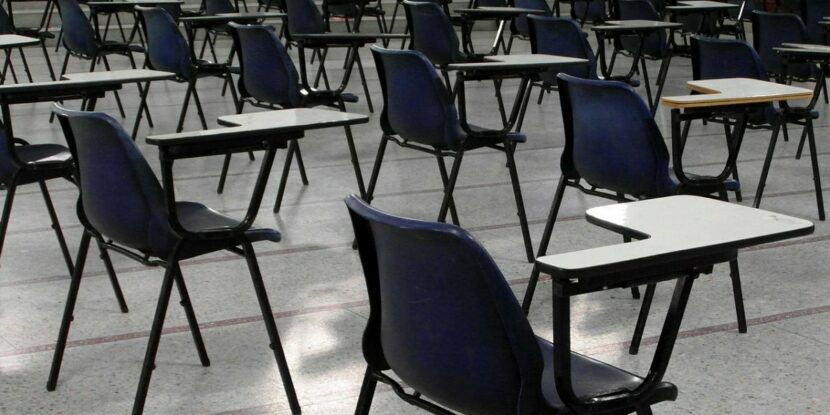The debate over what Secretary of Education Betsy DeVos should do about the Obama-era “Dear Colleague Letter” regarding school discipline, especially in light of recent school shootings, rages on. This policy threatens school districts with costly investigations if a disproportionate number of students belonging to a particular racial group are suspended or expelled. Democrat politicians and many groups on the more liberal end of the spectrum continue to demand that the policy be kept in place, believing that much of the disparity is due to discrimination and bias on the part of schools, instead of any outside factors. These groups ignore the pleas and concerns of teachers and administrators nationwide who see this policy as a detriment to maintaining a safe and orderly classroom and learning environment.
This issue has been discussed extensively in this space (see here and here for instance) as well as by other expert individuals and groups. The data, as will be detailed more below, both anecdotal and in organized reviews, seems to show overwhelmingly that this policy is not helping schools, students (especially those in poor urban districts), nor staff maintain a safe environment or improve academic achievement.
In a surprise development, those opposing the Obama policy received a boost from a somewhat unexpected source last week, when Bloomberg News‘ editorial board came out in favor of scrapping the Obama guidance. This outlet tends to see bias in lots of different areas and was more favorably disposed towards Obama’s policies in general. Yet, they wisely titled their column “Leave School Discipline Up to the Schools.” Here is an excerpt:
Concerns over high rates of suspension are certainly justified. Students who are repeatedly suspended often find themselves trapped in the dismal cycle of dropping out, failing to find jobs, and succumbing to poverty or criminality. Many come from the most disadvantaged populations. Nonetheless, allowing dangerous and disruptive students to stay in the classroom puts all other students at risk, threatening their safety and impairing their education.
States and districts ought to intervene when schools unfairly target minorities for punishment. But basing that judgment on whether schools have higher rates of punishment for minorities than for white students applies a dangerously blunt standard, which runs the risk of leading schools to be too tolerant of disruptive and dangerous behavior.
The data in the column includes this survey of school administrators showing how difficult the circumstances has become:
In a survey this year by the AASA School Superintendents Association, most respondents said the guidance letter hadn’t led them to change their policies. But the message from Washington seems to be getting through: Some 20 percent of respondents said they felt pressure from OCR [Office of Civil Rights] (though not necessarily from the guidance itself) to keep in school students that staff would have preferred to remove. In urban districts, the figure doubles.
Bloomberg goes on to describe a study in Philadelphia showing more harmful effects of the policy for the most vulnerable students:
“The poorest, most racially homogeneous, and most academically challenged schools” had most trouble complying with the ban, the researchers found. And “never-suspended students in many schools, including most schools that reduced their suspension rates, experienced a decline in academic performance, relative to the most plausible comparison group.”
While the Bloomberg column later recommends the Obama discipline policy be scrapped and more trust be placed in teachers and administrators who deal with these situations every day, they unfortunately support spending state and federal money on other discipline alternatives like Positive Behavioral Interventions and Supports (PBIS). This is in agreement with radically liberal education professor Linda Darling Hammond (terrorist Bill Ayers’ choice for Secretary of Education under the Obama administration). I have written about the behavior modification, data collection, and parental autonomy concerns of PBIS, but the Wisconsin Institute for Law and Liberty has also researched the program in Wisconsin schools and detailed two alarming findings:
- While suspension rates have fallen in schools with large numbers of African-American students, those rates have increased in schools with small numbers of African-American students implementing PBIS.
- Math and reading proficiency rates are lower in schools that implement PBIS — more so in rural and suburban schools, but also in Milwaukee.
In order to provide safety for teachers, staff, and students, and to restore a good learning environment in our public schools, rescinding the Obama school discipline policy is not just a good idea — it is a necessity. In the long-term, however, the federal government must retreat from its wretchedly bad policy of subsidizing single parent families. There is voluminous and well-established research showing increased behavior problems and delinquent/criminal activity in children living in single-parent households. According to research based on Census Bureau statistics, only 17 percent of black teenagers live in households with two married birth parents. This tragedy is government-created, and the Obama discipline policy has only made things worse for everyone.
You may make your opinions known about this critical issue, as well as on the dangers of expanding school mental screening and further weakening student privacy protections, to the federal School Safety Commission at safety@ed.gov.


